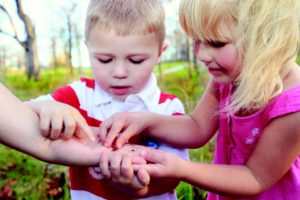
Picture Credit: sasint
Why do you need to educate in children a careful attitude to nature? Is it really impossible to do without all these stupidities, for man is the summit of evolution and the master of the planet, has the right to arrange the world at will.
Environmental education of children
Ecology is not just a fashionable word, which is used where necessary and not necessary. The planet on which we live is not that great, but there is no spare. “The crown of nature,” the Man, so treated his only place of residence, that the Earth can not independently restore its planetary health: the ecological crisis becomes increasingly threatening. Only ecologically meaningful behavior of every inhabitant of the planet can help in its salvation from gradual destruction.
But for this purpose, it is necessary to form a new, responsible type of thinking, to instill an ecological culture for new generations.
At the end of the twentieth century, the term – the ecology of personality, which has become one of the aspects of morality, has emerged. It is impossible to educate a moral person without forcing him a culture of careful attitude to the world in which he lives.
The importance of environmental education for the development of the child’s personality
Environmental education of children is not only the willingness to protect nature, but also the formation of the foundations of morality.
Getting new knowledge about the surrounding world, processes taking place in it and living organisms living near human beings promotes the development of intelligence.
The ability to feel the beauty of nature develops an aesthetic sense.
Observations of natural phenomena, plants, animals develop attention, ability to concentrate, memory.
Care of plants and animals helps to raise care and responsibility, responsiveness and the ability to feel compassionate.
The role of parents and educators
Recently, in social networks, reports of cruelty towards animals and people often appear. All these are the consequences of omissions in education, the lack of a moral attitude towards nature, and the lack of empathy.
The most appropriate time to start raising the ecological culture is preschool age. It is precisely at this time that the foundations of the person are laid down and the attitude towards the world takes shape.
As with everything else, the main tool of upbringing is a personal example of adults. Parents can speak a lot of words, but if the father does not consider it pathetic to kick a cat, the mother takes a tired dog to the shelter, and all of them leave a garbage mountaineer at the place of the picnic – the words will be meaningless.

Picture Credit: mcconnmama
The garden can have a great living area. But the lessons in it will not leave a big trace, if in the eyes of children the tutor will drive stones accidentally lost to the playground for the mourner.
Unfortunately, many parents and educators do not pay enough attention to the ecology of the personality of their pupils. As a result, a person with deformed ideas about morality, morality, humanity and responsibility of each person can be formed for the living conditions of all humanity.
Ways of raising the right attitude towards nature in preschool age
A little child knows the world by all senses. All the interesting things he wants to grab, feel all the organs of senses, check for strength. It is at this age that one can and must begin to form a careful attitude towards everything living.
Parents need to teach the child to observe nature and animals. Explain that a person, even if he is still a child, is stronger and more intelligent than other living beings. And therefore his duty is to protect and care, not to offend and not to destroy.
The child may not understand why it is bad to tear the butterfly of the wings, pull it behind the tail of the cat, scare away the birds. The task of parents and educators is to tactically explain what pain and fear are that all living creatures experience.
Direct contact of younger preschoolers with wildlife should take place with the participation of adults under their control.
You can learn how to gently stroke a cat and a dog so that both sides get pleasure from the process.
It’s good to watch bird or squirrels – quietly, patiently and carefully, so as not to frighten. Adults should attract the attention of the child to what different birds live around us, how they differ in plumage, size, behavior and voices. Even the most common crow can be a source of positive – these intelligent birds often show the most interesting behavior and savvy.
Plants also provide an extensive field for observations and obtaining varied experiences. Flowers can be sniffed and considered, developing the concept of color. The leaves can be compared in shape and size, they perfectly illustrate the change of seasons.
With older children you can take care of plants and animals together. It is very useful to give the child the opportunity to plant and grow a flower or tree. Realizing, by his own experience, how much time it takes for this, how much patience and labor, he hardly will mindlessly tear flowers on a flower bed or break branches.
Well, if you have pets in your family. But to start an animal “for a child”, if parents are not ready to take responsibility for the well-being of the pet, it is inadmissible. This applies to everyone – fish, parrots, hamsters, kittens and dogs. A miserable creature who does not receive proper care is the worst example of an attitude towards an animal. As, however, and indifferent deliverance from the tired and unnecessary pet. Parents will forget about the thrown out animal in a week, and in the child this incident will remain in memory for many years.
Where to go with the child
If there is no desire and opportunity to keep animals at home or grow flowers, you can teach a baby love nature in specially created places for this.
The zoo is a good place for a long Sunday walks. But in a zoo it is worth driving children only when it is well-equipped, animals are kept in it under good conditions. From a visit to a mobile animal in which the animals are doomed to sit in tight dark cells, where they are deprived of care, and often a normal diet, it is necessary to refuse. The strongest impressions of meeting with the representatives of the animal world can inspire a little respect for nature for life.
Exhibitions of dogs and cats. In many cities, several times a year, exhibitions of paternal animals are held on which special shows and performances are organized for children, they tell about dogs and cats, they learn how to communicate with them. But be prepared for the fact that after each visit the baby will ask you to start a pet.
In many cities there are eco-farms where cognitive excursions for children and adults are held. There you can look at cows, horses, sheep, poultry, feed them. Riding on horseback or dog harness is often offered. There you can also see the fruits and vegetables grown in the fields and in the gardens, which the townspeople buy in stores.
When choosing where to go with a child, do not forget about the arboretums, botanical gardens and exhibitions of flowers, indoor and garden plants. Very interesting is the visit to the local lore and zoological museum.
After returning from the excursion, ask the child to draw what he saw and remember.
Children love to listen and write stories and tales, and this gives parents a great opportunity to tell them about nature. Everything that was noticed on a walk can become the basis of the story for the story, which is the best to compose together.
All this requires time, patience and at least minimal knowledge – to tell what a child is about, to answer his questions. But do not neglect environmental education. Today’s adults leave their planet’s children in a far-off condition. Let the next generations learn to protect the world in which their descendants live. Another suitable yet not found.
